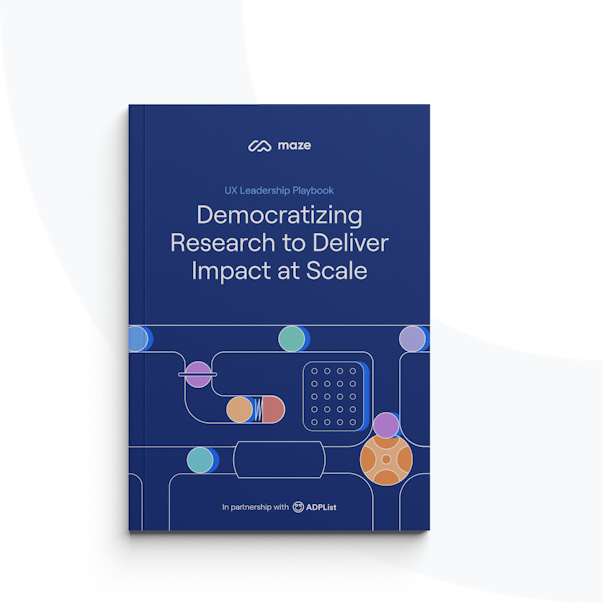At Maze, we believe anyone should be able to test anytime, anywhere to access invaluable user insights that inform product and business decisions. That’s why we’ve decided to partner with ADPList to create Democratizing Research to Deliver Impact at Scale—our new playbook on scaling product research, featuring insights from over 30 UX Leaders. In this article, you can find the introduction of the playbook written by Behzod Sirjani, founder of Yet Another Studio and former research lead at Slack and Facebook.
Humans are wonderfully curious. From a young age, we explore, touch, and question much of the world around us. All those interactions create feedback loops, which allow us to clarify our understanding of various phenomena. If you’ve ever watched a child go through this process of wonder, engagement, and learning, you know what a beautiful thing it is.
Organizations are curious too. They benefit from feedback loops that involve engaging with the people they are trying to serve—both their customers and employees—and this learning allows them to make better decisions about how to support both audiences. While many organizations have teams that are responsible for learning, nearly everyone in an organization is responsible for decision-making on some level. Yet, there is so much work to do at many of these organizations to enable and empower curiosity broadly—especially in ways that allow people to make more evidence-based decisions.
Over the last decade, something I’ve developed strong conviction around is the idea that the velocity at which an organization learns is one of the key leading indicators for success. People regularly talk about the importance of “failing fast,” but what they’re really highlighting is the need to learn quickly and adapt. The longer your feedback loops are, the more conviction you’ll need for each of your decisions.
Unfortunately, it seems that most organizations care about building a culture of knowing, not a culture of learning. It's something that we're conditioned to from an early age and rarely encouraged to break away from—we get rewarded for what we know, not what we question. But if you look at the challenges that organizations face and think about ones that have succeeded over decades, success does not come from regurgitating answers about the past. It does not come from being an organization that knows—it comes from being an organization that learns.
Being an organization that learns means having a perspective about the world and regularly challenging that perspective by anchoring it in reality. Those of us who have been trained in the arts and skills of research have a responsibility to invite everyone in the organization to meaningfully participate in the act of learning and to do so in whatever ways are safe and comfortable for them. We need to be guides, rather than the gatekeepers we far too often become.
The process of becoming an organization that learns starts with intentional, responsible, and sustainable practices of learning. You’ll want to make sure that at each part of your organization, throughout the different parts of the product development process, and at each of the touchpoints you have with customers and each other, people in your organizations have the right mechanisms to learn in the ways that are appropriate. Learning is already happening in different ways across your organization, so you'll need to acknowledge these practices and identify ways to better structure and support them. This means building operating models like continuous product discovery that allow everyone to participate in ongoing research, meaningfully, while respecting individuals’ autonomy and agency. In other words, becoming an organization that learns starts by responsibly democratizing research within your organization.
When I hear people talk about democratizing research, they often speak from a place of fear. They fear that inviting others into our practice would reduce their power or impact as researchers. I couldn’t disagree more. I firmly believe that democratization is our job and that by educating, enabling, and empowering others to play a more active role in research and learning, we're going to build better products and practices. We'll have the right people focused on the right kinds of activities and increase the voices and perspectives involved in the way we learn.
Democratizing research is not and has never been the end goal. But intentionally making space for everyone to participate is a critical step toward building an organization that learns. Whether this is by anchoring your UX research strategy in curiosity, or working with team members on an individual basis to develop research skills. We need to recognize that our value as researchers is not only in the artifacts that we create but, perhaps even more so, in the activities that we make possible and the decisions that we help people in our organizations make more confidently.
That’s why the teams at Maze and ADPList created Democratizing Research to Deliver Impact at Scale. We hope that this playbook and the voices and stories represented in it can provide you with perspectives, tools, and strategies for how to mature your research practice and your organization. The goal here is not to say that we need to give away everything, but that many of us have seen the profound impact of democratization on our customers, our products, and our companies. As the role of the researcher has adapted from being less like an oracle to being more like a teacher and facilitator, we want to equip you to make the shifts that make sense for you and your organization and open up a broader dialogue about what this change can and should look like.


